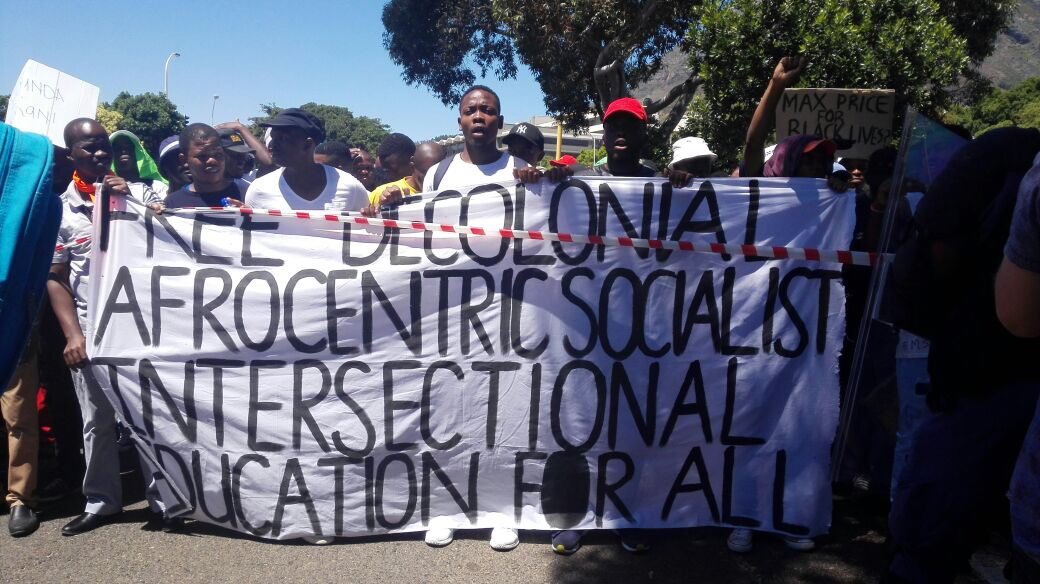The University of Cape Town (UCT) will this week begin the third of a series of workshops unpacking the issue of transformation within the law faculty. Coming on the back of country-wide protests against the so-called ‘colonisation’ of the education system, the discussion is an inclusive reflection on the current legal and interdepartmental structures within the university and broadly within South Africa. Importantly, the seminars are aimed at redressing continued colonial and Apartheid structures that have marginalised the majority of the country.
Speaking to VOC News, dean of the UCT Law Faculty, Professor Penelope Andrews explains that the discussion will focus on transformation and the decolonisation of legal education.
She says that the series is part of a broader conversation at the university in which university staff and students have been have been unpacking the varied definitions of ‘colonised education’.
According to Andrews, the argument of decolonisation, which was raised since the early part of the 20th century, is not a new phenomenon.
Reflecting on countries such as Ghana, which was formerly decolonised some 60 years ago, she asserts that decolonisation in these communities meant stripping courts and universities of colonial structures that served the minority.
“It was part of the way in which academics and activists thought about what a decolonised society looks like and particularly how the institutions reflect that decolonisation,” Andrews stated.
The series, Andrews notes is therefore aimed at understanding the role that colonisation has played in creating structures that perpetuate unequal systems and will bring to the fore mechanisms that need to be instituted in order to improve equity within legal and educational structures for the broader population.
“Decolonisation is about equity, quality, fairness and social justice within South Africa, where students have been pushing for decolonising law – it is about making the South African legal system serve the majority of the population.”
Given the fact that the Constitution of South Africa embodies the essence of what it means to be ‘decolonised’, she says that while the constitution provides answers to redress the issues of inequality, attention needs to be directed toward implementing the directives of the document and the vision of its authors.
Though UCT has long been labelled an institution rife with racism in its various departments, many claiming that the institution has maintained the old structures that have impeded non-white South Africans under Apartheid, Andrews says that this phenomenon is evident in many other institutions and sectors of society.
“The project of transformation has stalled in South Africa, so what the students have done is ask us to turbocharge these issues.”
“Vice chancellor Mamphela Ramphela came on board in the late 1990’s, [so] if you look at UCT and the programmes you will see there are real attempts to deal with decolonisation, transformation, and to eradicate the racism, which is part of an institution that was previously a ‘white institution’.”
She further urged those within the legal fraternity to lead issues relating to social justice as it speaks to the tenants of the constitution, which is essentially a legal document.
While the seminars will not be formally represented by Fees Must Fall members or civil society organisations, it will include experts chosen by the student movement, such as Professor Joel Modiri.
“Modiri has a workshop with students, and three of those who are presenting their work and leading the discussion are students who have been active in Fees Must Fall – [since] student participation is key.”
Commenting on concerns of student protests erupting as a result of the seminar’s sensitive topic of discussion, Andrews says that protests would be unwarranted since students from the student movements are actively involved in the discussions.
“So far, because students have been involved and because staff have been attending, I feel that this is a dialogue for which there really is no reason to protest,” she continued.
All seminar discussions are to be recorded, the outcome of which will tabled in a report scheduled to be released at the end of the academic year, after which a workshop will be hosted to discuss the findings, the way forward, and how the university will ensure that the process of decolonisation is not derailed.
Upcoming Seminar Schedule:
April 20: Professor Joel Modiri, University of Pretoria (13h00, Lecture to Law Faculty. 16h00 to 19h00, Engagement with Students)
May 18: Law Faculty Panel on Decolonising Law; Ms. Fatima Osman, Dr Amanda Barratt, Professor Jaco Barnard-Naude, Mr. Khomotso Moshikuro, Judge Dennis Davis. (13h00 to 14h30)
June 8: Professor Pumla Gobodo-Madikizela, University of Stellenbosch
(13h00 to 14h30 – Lecture to Law Faculty and Question and Answer)
June 22: A/Professor Andrew Hutchinson, UCT Law and Mr. Nkanyiso Sibanda, UWC Law
(13h00 to 14h30 – Lecture to Law Faculty and Question and Answer)
VOC 91.3fm






 WhatsApp us
WhatsApp us 

